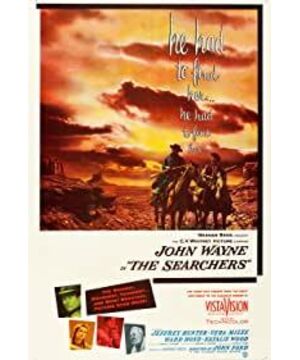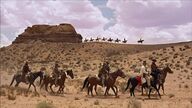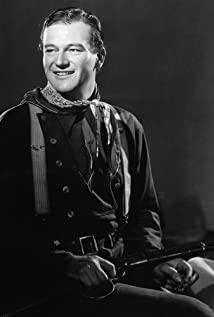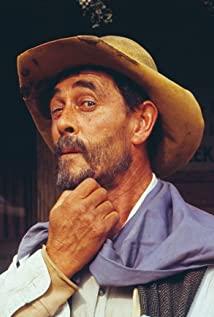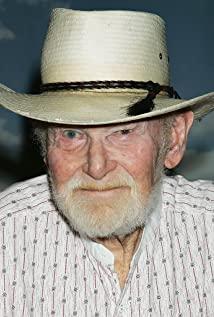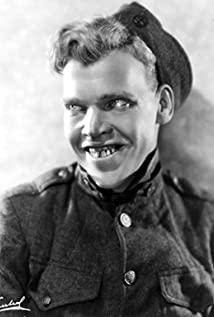In a sense, the movie is divided into two clues, one is the family line and the other is the wilderness line. Of course, according to my interpretation, it has nothing to do with racial discrimination. In fact, family and wilderness, civilization and wildness have always existed as opposites in traditional westerns, while the heroes of westerns always have two attributes. They can't really integrate into any party.
The protagonist Ethan is actually totally incompatible with the civilized world. Whether it is the funeral of his relatives, his ambiguity with his sister-in-law, and his cruelty and untimely, all show that he is essentially closer to the Indians he hates. (In fact, he speaks Indian as well as Scar's English). He is actually the scar among white people. But he is eager to integrate into civilization, eager to return to the family, eager to get the love of his sister-in-law. His persistent search for his niece is actually mixed with these two emotions, one is the unstoppable vengeance and bloodthirsty impulse in the wild, and the other is the strong complex of the family that has passed away.
From the beginning and the end of the movie, the door is used as a frame. The opening of the movie is to open the door and see Ethan walking out of the wilderness. At the end, from the door frame, Ethan is seen turning to leave the house, and the door is closed. A door separates the family from the wilderness, civilization and the wild. The hero always tries to enter this door, but finds that he will never get in.
Martin's image is the same as the same type of characters as Joey in 1954 "The Wilderness" and Marty in 1969 "Land Thunder". They are all young people who re-witness the heroic behavior. The difference is that Joey admired Sean extremely from the beginning, and his testimony only repeatedly confirmed Sean's fabulous skill. And Marty was very distrustful and disdainful of the sheriff at first, but after experiencing hardships together, he realized that the hero is still the same hero. They all reflect the attitude of the youth towards their parents at that time, and their efforts to restore their reputation. In the 1956 "Searcher", the relationship between Martin and Ethan is the most worthy of taste. Martin does not admire Ethan. The reason why he has been searching with Ethan is not because of trusting Ethan. On the contrary, he felt Ethan’s madness. From the very beginning, he foresaw that Ethan might kill his niece himself. So determined to stop him. The mythical images of the fathers and the heroes of the West were warned by the youth for the first time in this movie and questioned their murderous behavior.
Martin's family line is a side line of this movie outside of the wilderness search line. This side line is the most interesting part of the movie, and it is also the part full of joy. As Martin's girlfriend Luo Li, she always persuaded Martin to lay down his gun, get off his horse, and return to the family like all Western film women. But Martin rejected Luo Li because of his discomfort with Ethan. Although Martin wrote to Luo Li afterwards, the person who sent the letter to Luo Li took the opportunity to pursue Luo Li. In the end, Luo Li actually married the messenger. On the day of the wedding, when everyone was singing and dancing, Ethan and Martin returned, and then Martin and the man started a duel and fought a gangster fight.
This section makes me quite happy. And besides being funny, the director actually made a comparison with Ethan. Martin is still a man with a home to go back to. In fact, he did enter that gate with Luo Li in the end. Only Ethan is truly alone forever. He wandered around the door for a while, turned his horse's head around, left, and then the door closed. The hero and the family are thus separated. Behind the door are civilization, community, and family. Heroes can never enter.
The Indians are motivated by behavior in this movie, and they are no longer a prop-type character that promotes the development of the story as in the past Western movies. The reason for Scar's murder was that the white man killed his son. In fact, Scar is very similar to Ethan. But the status of Indians as subjectivity still does not exist. The cute Indian girl "looked" and came out to be funny. She was bought as a wife by Martin somehow, and Martin kicked her out of the bed annoyedly. To be honest, although I laughed and laughed at this passage, I also found it quite uncomfortable. I really didn't treat people as human beings. And "Look" was finally killed innocently by the white army.
Martin's semi-Indian identity is actually meaningless in this movie, because it did not affect Martin's actions at all, nor did it promote the development of the plot. Many people like to emphasize Martin's Indian ancestry, but in my opinion, it is of little significance to the film, nor can it prove that the film is more sympathetic to the Indians because of this.
—————— All of the above are digressions, gorgeous dividing lines————————
Well, what I’m actually trying to say is that many parts of this movie remind me of Hitchcock, because it’s right The use of surprise and suspense is quite obvious.
Two places in the film surprise the audience without warning. One is the movie title. Brother Ethan’s family and the pastor were eating happily, but someone said that a cow had been stolen before entering the house. He also joked that no one would steal pigs in the future. The director didn't give any hint. This sentence is like everything they say. It feels irrelevant. You may not pay attention to the distracted words, but who would have thought that this stolen cow led to the tragic ending of the slaughter of Ethan's family?
Let's imagine what would happen if Hitchcock handled this paragraph? He might let the audience know in advance that this was the usual strategy used by the Indians before the Indian sneak attack (just like "Mentally Ill" did, first show how a victim was killed, and then every time someone enters the hotel, especially close to the bathtub. , Will make people fearful). This "time bomb", which the audience knows in advance, will make the whole breakfast scene that was originally plain and even boring show a sense of tension and anxiety. Especially when the men decide to go out to chase the bull thief collectively, the audience will cry from the bottom of their hearts, begging you not to go, they just want to lure you away, and then attack your family!
But John Ford chose surprise instead of suspense. When a group of people spotted a dead cow thrown on the side of the road after being killed, they suddenly realized that they had been tricked. At this time, the picture immediately jumped to Brother Ethan's family, and they saw the Indians approaching their house from a distance. But the last surprise came at the cost of the tediousness of the breakfast scene. Because I didn’t know the major turning point that would happen next, the breakfast section could not attract the attention of the audience at all, and their conversation became purely parental. .
Another use of surprise is that Ethan searched it back, but didn’t tell Martin anything. Then at night, when someone said to see Ethan’s niece, Ethan suddenly told him that what you saw was wearing her clothes. Indian, because the girl has been killed, I saw her body while searching and buried her.
In this section, the surprising effect is better than the suspense effect. Because when the person said that he found Ethan's niece, the audience would be overjoyed, and the long search finally yielded results. At this time, Ethan suddenly informed the girl that she was dead, and immediately changed the mood of the audience from joy to sadness. This kind of regulation of the audience's emotions is handled quite well.
The biggest suspense throughout the film is whether Ethan will eventually kill his niece. Because the film has shown Ethan's madness and his preparation to kill his niece many times before, his search behavior later appeared to have a complex emotional modulation effect on the audience. On the one hand, the audience hopes that his search will be successful, because it has been five years (and if you find it sooner, Martin will be able to go back and stop Luo Li and the messenger's wedding soon); but at the same time, the audience will worry about his search because Once he finds his niece, he is likely to kill her immediately.
This complicated emotion completely aroused the audience's heart in the last part. Martin drove a horse to chase his niece. Everyone thought he was going to kill the poor girl. Who knew he was holding the girl up. He said, boy, we are going home.
In addition, from this I will think of some psychological mechanisms of genre films. The so-called suspense is actually a "premise", and this "premise" causes the connotation of the scene shown later to be completely distorted. For example, Hitchcock's most experimental "Imperial Soul", this film does not rely on editing at all to achieve the maximum suspense effect, which is amazing. Because the suspense is largely caused by editing. But the suspense of "Imperial Soul" is not in any editing, but purely in the "premise". The premise is that the two people hide the body in the table after killing someone. Because of this table with corpses (and the audience knows this), all the life scenes in the back are suspenseful, tense, and terrifying.
Let's imagine that if "Imperial Soul" lacks this premise, assuming that the audience does not know that there is a corpse hidden in the table, what a boring and terrible movie this is! From beginning to end, it is a group of people eating, chatting, and tidying up the table. There is no content, no changes, and no plot conflicts. Until the end, a surprise. But because the audience knew the corpse in the table beforehand, the same scene and the same dialogue were given a completely different connotation, which would arouse completely different emotional reactions from the audience. The parents of the deceased were eating at the table where the corpse of their son was hidden, and the murderer was still talking witty words to the parents, which made people feel creepy; every time someone cleaned the table and tried to open the table, it made people nervous, because the corpse May be discovered soon.
Therefore, because there is a "premise", the whole narrative can make people nervous through trivial things and make people look forward to it.
Genre films are largely artificial to create this premise. For example, "The Wilderness", we know that this is a western movie, so when the actor Sean first appeared, although no one introduced him, although he was very tolerant and self-restrained, some people even insulted him and treated him face to face. He did not resist when he splashed alcohol, but none of us would really think that he was just as useless as it appeared on the surface. We know that he is bound to possess special skills, and he must be a hero. Therefore, each of the aforementioned provocations against Sean by others has been given a different connotation, which makes the audience have different emotions, a kind of suspense, tension, and expectation. Will Sean make a move this time? How much can Sean endure? How good is Sean?
So, although in the movie "The Wilderness", Sean really shot only in the last few minutes, he really took all the bad guys in only a few minutes, and then the movie ended (the audience who came to the exciting action scenes wanted disappointed). But the first half will not make people feel the slightest dullness. In fact, because the director created the atmosphere so well, that kind of tension and suspense has been stimulating the audience. Every time we expect that Sean will be killing him soon, and then Expectations were frustrated; then more tense and more anticipation, and then frustrated again. Until the last Sean drew his gun in a rage, it really made you realize what a "climax" is. The director’s scheduling is obviously not entirely the director’s personal credit, but to a greater extent stems from the audience’s expectation and suspense caused by the acquiescence of genre movie routines. Because we know that Sean must be a hero, and Sean will draw his gun.
Similarly, horror movies actually rely on this type of default and suspense. Many people think that horror movies mainly rely on surprise (scare), which is actually wrong. Because before the last second of fright, there is a long sense of suspense and tension. This tension is the real source of terror, and the last fright instead releases your sense of terror.
This long sense of tension is that you know what will happen, you just don't know when and how it will happen. But the genre of horror movies, and the conventions of the audience tell you that when a fixed scene appears, when a strange music appears, something horrible will happen. The silly character in the movie obviously doesn't know this yet. He is still acting as usual, and the audience knows that he is about to be killed (of course sometimes the director will deliberately joke). Therefore, in a state of tension, suspense, anticipation, and fear, we wait for the conventionally horrible moment, and the longer that moment drags on, the more painful, tense, and frightened the audience will be. When the ghost (or murderer or something) really appeared as promised and killed the character, the audience was relieved because the suspense disappeared and the tension disappeared (if there is any horror effect at this time, it is bloody The degree and the degree of nausea have nothing to do with suspense).
Therefore, genre films are to a large extent to create a "premise" for the audience. Only by watching the movie with a pre-knowledge of the "premise" can the audience experience happiness and interpret the hidden meaning behind the picture.
View more about The Searchers reviews


